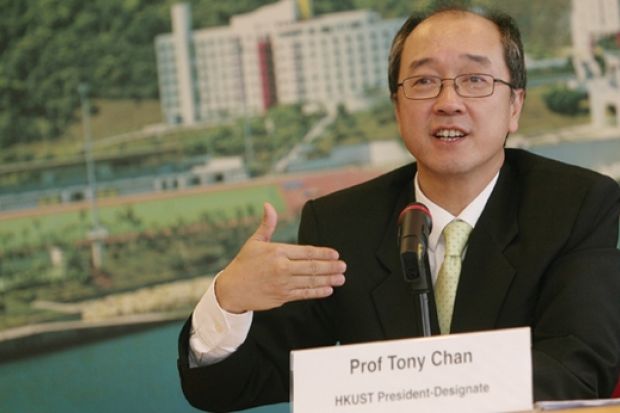Visitors to our university often come with this question on their lips: how did the Hong Kong University of Science and Technology (HKUST) rise so high, so quickly? Here is how I answer them.
The first factor is our strategic positioning. HKUST was mandated to fulfil a specific mission: as a global elite research university, we were to be a catalyst in Hong Kong's transition to a knowledge economy through science, technology and business, supplemented by the humanities and social science training necessary to create well-rounded global citizens.
The second factor: such an ambitious mission must be driven by the best talent. We work on the premise expressed by Chia-Wei Woo, our founding president: "First-class people attract other first-class people." A wide global net was cast to recruit such talent, and the result is a truly international faculty: 80 per cent of our scholars were educated or employed at world-leading universities before coming to HKUST.
We have 25 Institute of Electrical and Electronics Engineers fellows, the elite of the engineering fraternity, including six inducted this year - the highest concentration of any Asian university. And all three newly elected members of the Chinese Academy of Sciences who hail from Hong Kong are HKUST professors.
Our selection of students is equally rigorous, attracting top students from abroad, this year including Beijing's number one science student. From mainland China alone, more than 4,000 students vied for just 150 undergraduate places. And of 165 international recipients of the prestigious Hong Kong PhD Fellowships in 2012-13, 41 chose HKUST.
Third, to provide an environment where talent thrives, we have installed a merit-based management system, benchmarked to the world and highly transparent. Our academic milieu is unique: its culture is Chinese, but its management is decidedly Western. This best-of-both-worlds environment, where academic freedom is vigilantly protected, has proven attractive to accomplished international academics. We are the most "American-style" university in China: indeed, you can think of us as a top international anglophone university.
The fourth decisive factor is that our researchers are free to pursue their passion for innovation. As a research-focused university, our output has made a global impression. For example, in 1993, just two years after our founding, our scientists successfully developed the Operational Windshear Warning System for the new Hong Kong International Airport.
When we were 10 years old, we unveiled the world's smallest carbon nanotubes. In 2010, we made an impact on a global public health issue with the world's first smart antimicrobial coating. Last year, China designated our Molecular Neuroscience Center as a State Key Laboratory in light of our frontier research on degenerative diseases.
Finally, we feed on Hong Kong's strength as a finance, business, money, information and personnel hub within China but with a Western legal system by focusing on management and business education.
Today, the Economist Intelligence Unit ranks our joint EMBA programme with the Kellogg School of Management as the world's best.
One can also say that HKUST's rise is closely linked to China's, with Hong Kong sitting inside the world's number two economy with a unique "one-country, two-systems" arrangement. As early as 1999, we anticipated this by establishing a foothold in Shenzhen, a key driver of China's high-tech development. Our outposts now cater to industry, research and education in the vibrant Pearl River Delta. As the area evolves from the "world's factory" to a producer of cutting-edge technology, HKUST's research and human resources will play an increasing role.
Our focus, system and people have delivered impressive outcomes, but we are not standing still. Our Undergraduate Research Opportunities Program, in which undergraduates participate in research alongside veteran scholars, helps prepare scores of our graduates for the world's leading graduate schools and industrial enterprises.
Always alive to the possibilities, we are now seizing on Hong Kong's shift from three-year to four-year undergraduate programmes. We are using the extra year to give our students an all-round education, sharpening their critical and creative skills and breaking the centuries-old Asian emphasis on rote learning.
We are expanding exchange programmes with 200 partners, now enjoyed by 30 per cent of our students (soon to be 50 per cent). With almost 20 per cent of our undergraduate intake from non-local sources, HKUST is Hong Kong's most international university.
We are also developing an enterprise/social responsibility cooperative programme to prepare our graduates for global citizenship.
Academically, we are looking to extend into disciplines such as aeronautics, energy, public policy and social entrepreneurship in the coming years. And we are forming close collaborative strategic relationships with selected top universities internationally and inside China.
In 20 years we have come far, but we are working hard to make the miracle continue. Our positioning can be characterised thus: "Global excellence with a China angle." We firmly believe that HKUST is well placed to play a vital role in developing Hong Kong's future leaders as well as supporting China's technological innovation.
Register to continue
Why register?
- Registration is free and only takes a moment
- Once registered, you can read 3 articles a month
- Sign up for our newsletter
Subscribe
Or subscribe for unlimited access to:
- Unlimited access to news, views, insights & reviews
- Digital editions
- Digital access to THE’s university and college rankings analysis
Already registered or a current subscriber?
